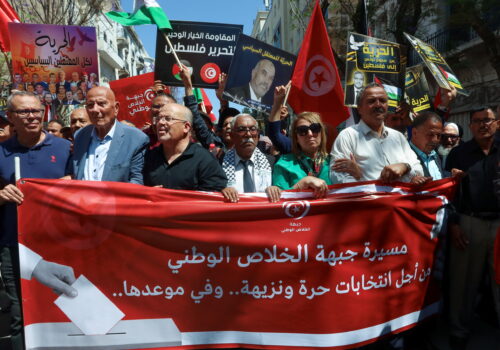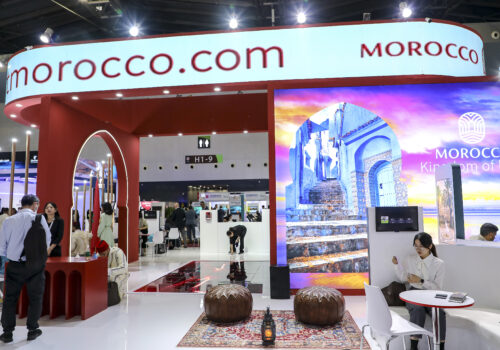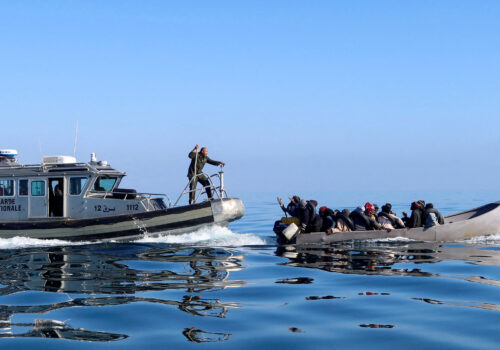The Mattei Plan is an opportunity for North Africa
The Mattei Plan, announced in October 2022 by new Prime Minister Giorgia Meloni as an innovative vision that the government of Italy would exercise in its relationship with Africa and African countries, has immediately taken center stage in the European political debate. The Mattei Plan is much more than an economic development plan, and it could become the main tool for defusing dangerous crises in Africa, particularly in North Africa. It has a strong economic component, consisting of collaboration with other Western partners in African countries if they agree to fully cooperate with the proposal. In essence, the Italian prime minister’s plan makes the donor country act as an equal partner in every step of any project undertaken in any African country.
The Mattei Plan is not supposed to operate in a vacuum but is solidly affected and conditioned by the wider international community. However, evolving international dynamics among superpowers and regional powers do not bode for much optimism. Despite some positive events—such as French center-left parties’ relative containment of what was initially expected to be a glamorous victory for right-wing populism and extremism, as well as some successes in cohesion and policymaking by international organizations and institutions such as the Group of Seven (G7), Group of Twenty (G20), and NATO—the trend doesn’t look positive at all. In the background lie the war in Ukraine, the Gaza war, and a potential Chinese invasion of Taiwan. The renewed rivalry for world dominance and the great-power competition between the United States, China, and Russia loom above everything.
North Africa is particularly vulnerable to these dynamics. The ideal part of the Mattei Plan is that it can positively defuse regional tensions. It has been a long-held belief of the European Union (EU), the United States, and the main international institutions such as the World Bank and the International Monetary Fund that, to create a beneficial environment for economic development and political evolution, the five North Africa states of Libya, Algeria, Tunisia, Morocco, and Mauritania should agree to form some sort of “union.”
SIGN UP FOR THIS WEEK IN THE MIDEAST NEWSLETTER
The Union du Maghreb Arabe (UMA) was born out of this thinking in 1989. In reality, the regimes then in power created it to fight the Islamist-led popular revolts, which, starting in the mid-1980s, were occurring in each of the North African countries in increasing numbers. UMA was also created to facilitate the exchange of security personnel and intelligence cooperation by these regimes. Because of this, no other sectors—such as the social, political, and cultural sectors—were developed. And once each UMA country felt more secure, it de facto withdrew from the union.
For a brief moment following the 2011 Arab Spring uprisings—which were poised to bring to power, in a more or less democratic way, new elites more responsible for the wellbeing of their populations—international actors thought there was a will to renew a pledge to the UMA. However, the five North African regimes were generally unresponsive to their populations’ demands. There was an expectation that things would improve through democratic elections and that, once in power, the populations would be more prone to engage their neighbors in some kind of integration. But that didn’t happen. Instead, each country backslid into authoritarianism and, thus, in a more isolationist direction.
With this in mind, the prevailing trend, as determined by today’s evolution of the international system, may lead North Africa not toward integration but toward creating rival blocs. Morocco, which has elites strongly tied to Western nations and with Western values, has adapted a policy of cooperation and alliance with Western countries, especially the United States, and institutions such as NATO and the EU. Clear evidence of this pro-Western position is King Mohammed VI’s adhesion to the Abraham Accords pushed by then President Donald Trump as a way to create a new peaceful path to collaboration between Arab states and the state of Israel, in exchange for the US president’s recognition of Moroccan sovereignty over the former Spanish colony of Western Sahara.
Morocco’s ruler has exerted enormous effort for Moroccan banks and commercial entities to penetrate the West African region’s economy. The success of this action has also gained much support for the ruler’s political ambitions.
Just to the East of Morocco and in contrast to its policies and economic activities, is the country of Algeria. The military-backed regime in power—which values nationalism, Arabism, and third-worldism—finds its legitimacy in the Algerian people’s war for independence from France in the late 1950s.
Algeria has been a staunch supporter of revolutionary and liberation movements in Africa and elsewhere. Thus, support for the Palestinian struggle against Israel quickly became a rallying cry in Algeria. Its relative closeness with the Soviet Union, and with Vladimir Putin’s Russia today, is the natural outcome of these positions. It is easy to see how Algeria could constitute an bloc adversarial toward Morocco. Add to this the wide influence that Algeria exerts on Tunisian President Kais Saied’s quest for absolute power and the natural gravitation of western Libya toward Algeria and Tunisia, and it’s easy to see the formation of bloc in opposition to that represented by Morocco.
Eastern Libya today is controlled by the rogue General Khalifa Haftar and his family, which is almost entirely dependent on Egyptian military support, and will probably detach the region from the western part of the country. Sadly, this would mean the end of a united Libya. This is a scenario that the West should do whatever it can to avoid. The United States seems too distracted by other issues and incapable of reacting to these trends. On the other hand, Italy and some of its European partners could use the idea behind the Mattei Plan to play a neutral role in the North Africa contest and help a rapprochement between Algeria and Morocco. This requires not making Algeria feel isolated from Western countries.
Prime Minister Meloni’s personal visit to Algeria in January 2023 was important for this reason, as was the one made afterward. Italian diplomacy was also active in keeping relations open and ongoing with Tunisian President Saied and in the warm relationship with the United Nations-recognized government in Tripoli. While this might sound ideal, Italy and its allies must take one step forward, which would foster a faster and deeper rapprochement between Egypt and Turkey. This could lead to an agreement in Libya in which the western part, strongly under the influence of Turkey, and the eastern part, which is entirely dependent on Egyptian support, may be convinced to find a way out of their crisis that entails the unity of the country rather than separation. A united Libya under the protection of NATO member Turkey and longtime US ally Egypt will not fall into the radical bloc. On the contrary, it might even be able to help lure Tunisia away from the pro-Russian potential bloc, while exerting an opposing influence on Algeria’s historical pro-Russian tendency by showing the benefits of standing with the West and collaborating with the Mattei Plan.
The Piano Mattei, a new vision of cooperation and collaboration on all fronts with the emerging societies of Africa, will be a great engine for this Italian and, ergo, Western policy of utilizing soft power to overcome issues that have previously created many problems for European countries.
Those who criticize the plan as empty of content, or cite its lack of purpose or precise allocation of resources, are missing the point. It is not only an economic plan but a political intuition to move away from today’s stagnant international cooperation policies and toward new dynamics that could produce extraordinary results if carefully implemented.
Karim Mezran is director of the North Africa Initiative and resident senior fellow with the Rafik Hariri Center and Middle East Programs at the Atlantic Council.
Further reading
Wed, Jul 17, 2024
How Tunisia’s upcoming presidential elections will erode its democracy
MENASource By Alissa Pavia
These elections will likely enable further consolidation of power and undo more than a decade of progress in building democratic institutions.
Mon, Jul 1, 2024
Diversification and growth: How the US-Morocco FTA boosts Rabat’s modern trade
MENASource By Amin Mohseni-Cheraghlou
With sustained commitment and strategic planning, the next twenty years can bring even more prosperity and development for the Moroccan economy and greater profits for US businesses operating in the kingdom.
Tue, Jun 25, 2024
A world in crisis is good news for North Africa’s political elites
MENASource By Alia Brahimi, Karim Mezran
Europe should not assume that increasing transactional dealings with these elites will produce stability on its southern frontier.
Image: FILE PHOTO: Tunisia’s Prime Minister Ahmed Hachani is welcomed by Italian Prime Minister Giorgia Meloni on the second day of the G7 summit, at the Borgo Egnazia resort, in Savelletri, Italy June 14, 2024. REUTERS/Guglielmo Mangiapane/File Photo



